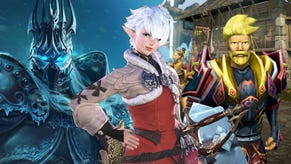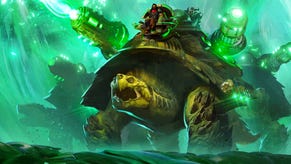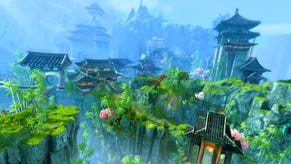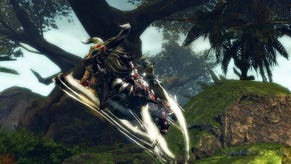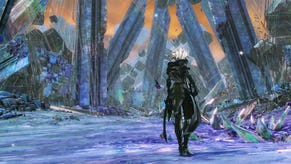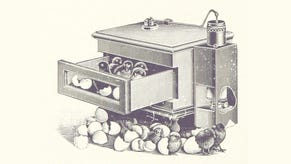Guild Wars 2 Interview Part 2: A Major Event
Yesterday, we talked to Eric Flannum about the combat and character systems. Today, we move onto its focus on its dynamic world and its personalised stories. And it's in these areas that, at least for me, that Guild Wars 2 is most exciting...
RPS: Fantasy games were thick on the floor when Guild Wars came out. It's only got more obvious ever since - what do you hope about Guild Wars will appeal to people who are a little burned out on the concept?
Eric Flannum: First off, the main things which attracted people to Guild Wars 1 originally was a lack of monthly fee. The fact that people used to dismiss GW1 as “not really an MMO”, but pretty much nobody can say that now. We've got all the features which a standard MMO would have. In addition to that, the look of the game – I think – is something you can't find anywhere else. Our artists have done a great job in creating a world which isn't trying to be photorealistic, but is very painterly and has a lot of style and will take you to some places you've never seen before in games. That sort of fantastic element. Our artists have turned it up a notch.
RPS: I actually still have the Guild Wars 2 concept art book within reach of where I'm sitting. What about the game elements?
Eric Flannum: In so far as the way the game plays, our event system combined with our personalised stories are a huge deal for us. Guild Wars 2 offers an experience that I don't think you can get in any other MMO out there – at least, I've never had this experience in any other MMO. The way the event system works, and because we have dynamic content scaling and all that, it allows you to play the game solo – like a lot of western players like to do – but... why play a multiplayer game if you're going to play solely by yourself? At the same time, we understand that a lot of people sometimes don't feel like grouping with a lot of people and talking to them. The thing you can do in GW2 – and the event system is a large part of that – is you can go out and play the game, and not group – or even really talk - to someone, and still get the feeling you're playing the game with a bunch of other people.
You're doing teamwork. It feels like it's a co-op game more than anything else. We've taken a lot of pains to make sure that when you're out in the world, your first thought isn't “Oh no – I've got to compete with those players for spawns” or “I've got to compete with these players for this quest I've got to do”. It's “Hey – cool! More players! We can help each other”. In our system, all players are given common, shared goals instead of having their own goals. So, it's really a different experience. It's kind of like when you play a good co-op shooter, and you go in, and you're possibly not even on voice-comms with the guys you're playing with... but you feel as if you're co-ordinating with them. Most MMOs don't really have that at all, and almost none of them have it in PVE gameplay. And GW2 really has that, and it encourages the real MP nature of an MMO more than most MMOs do.
RPS: Could you make an actual example of what you mean by that?
Eric Flannum: We were playing in the human starter area. There's an event where bandits are attacking these large pipes that bring water into the town. If players fail the previous event, the pipes get destroyed – and now workers are coming in to attempt to repair them... and the Bandits will attack the workers. I kind of wandered up to this area by myself, without any preconception of what was up there... and I noticed the waterpipes were all busted and broken, and there's some peasants working and then there's a couple of players defending. I join in and help them do this. I didn't have to take a quest – I explored, found this situation which required some heroic intervention and went up there. Because we have dynamic scaling in the event, what happened was that there were 3-4 of us defending, so the bandits would come in waves of 4-5 per attack. Eventually, as this thing went on – because you can see these burning waterpipes from quite far away on the map – other players started getting attracted, and coming over. And then there's a dozen players, and the game's now spawning attacks of 20 bandits at a time. It's getting super-huge and epic. All of this came really naturally from me exploring in the world, and eventually I'm co-ordinating with some other players which are putting down area effect spells which are healing everyone, and I'm crippling guys who are coming in to try and attack the worker ... without being in a group or talking. It all happens naturally.
RPS: That strikes me at the key difference between this and people like Warhammer who dabbled in Public Quests - the fact that they're responsive to the number of players there. If it works, it shouldn't matter how busy the area of the world is, yes?
Eric Flannum: The Dynamic content scaling is huge for us. It was one of the things we anticipated we needed, because at different times of your game, your population is going to wax and wane, so you're going to get times when there's just one person in your area and they have to be able to do things, but you're also going to get a time when a guild gets together and you'll have 10-20 people in an area. You have to keep things interesting, for all these different groups of people.
RPS: What about the personalised stories? What do they add?
Eric Flannum: We wanted to really give you a sense of who your character is. Basically, character creation has a portion of it where you can define your character's background. What your hopes are, what your fears are, who you are as a person – the sort of thing you may see in other single player fantasy RPGs. When you start a character you're not just an aimless warrior who's part of some race, who maybe knows a bit of your racial backstory. Normally, you don't really know who you are as a character, and we try to bring that in. Since we know the background that you've set for yourself, we change the story in response to that. So you and I may start as human warriors... but I may have said mine is born on the street and yours may be a noble. Our stories are going to start out very different. And more than just starting out – we carry that through to the whole story. You also make choices during the story which impact on what content you're going to see and the fate of certain NPCs and all that kind of thing. We really try to personalise the story for everybody who plays it.
RPS: In terms of a lot of that world-responding-to-character and dynamic world stuff... well, Conan wasn't able to sustain quests that put the player into dynamic, personally-involving situations past its extended tutorial. It ceased to be fresh, really. How are you going to avoid that?
Eric Flannum: One of the things is that... so other games who've tried to do that kind of thing haven't taken it all the way through the game. There's a couple of things we do to keep players from burning out. There are 1500-1600 events – I haven't counted, but that range of number. Other Games get into this rhythm where you have to “kill 10 of these” then you know it's going to be a “Kill 30 of them”... but our event system has a lot of different things which you can do. I mentioned earlier about the bandits attacking the water-pipe? In that same area, there's also these big bird herd animals - there's some really silly events like gathering apples for a local farmer. There's a farmer whose crops are being eaten by rabbits, who you chase and try to corral. And then you've got big epic centaurs attacking the local fort. The thing which keeps it fresh is that you never quite know what state the map is going to be in. Before when I mentioned it, the bandits had knocked out the water-pipes and currently the bandits were attacking the workers. It's possible that when I walked up that the pipes would be under-attack from the bandits. Or it could be that the pipes were fine and there were no bandits, and the NPCs were all at ease... so I'll wander through there and go to another area. No matter where you're going – even if you've been to an area – you may never know what's around the next corner. You may find something really unexpected.
RPS: How unexpected?
Eric Flannum: Some events are triggered by players, and are almost Easter-eggy. There's one where if players kill the deer in the forest then one of the predators who are used to feeding on the deer will come out and attack one of the villages. That's not going to happen unless players are active in the area. Just by the actions, or the times of day, whether it's day, whether it's night, whether players were defeated at certain events... there's lots of things which can happen in an area. Our game is really pretty dense with content. That's the key. Things constantly changing. A world that feels like it's alive. You never know what's around the next corner. That way we can help the game not static, not fall into the particular rhythm.
RPS: Are you mainly trying to appeal to MMO players, or new players or...
Eric Flannum: We're trying to appeal to all the players, really. In addition to us pushing the social nature, at the same time we talked about personal storylines. Our goal with that is to sort of give them the sense they're playing a really good traditional RPG. We want to appeal to anyone who'll play a PvE game, anyone who'll play a fantasy game, anyone who'll play something with RPG elements. We want to appeal to a lot of different play styles.
RPS: Thanks for your time.
We'll be bringing you more news on Guild Wars 2 as its development continues, I suspect.






